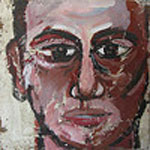(photo: Marwan Bu Haidar)
Published Thursday, December 15, 2011
Organizers said an estimated 6,000 Lebanese took to the streets of Beirut on Thursday to protest against a government decision to raise the minimum wage, declaring it insufficient.
The Union Coordination Committee (UCC) led the day of protest as public school teachers and other public servants went on strike, amassing in front of the government headquarters at the Grand Serail to demand higher wages and better living conditions.
Activist Farah Kobeissi said the protest "exceeded our expectations" as it was a rare major rally in Lebanon that solely dealt with people's economic standards, and was not sponsored by a local political power.
"We never expected this amount of people [to protest] for demands related to their daily lives. Today's demonstration was a milestone," she told al-Akhbar.
Protesters are angry at a cabinet decision to approve Prime Minister Najib Mikati's plan to modestly increase the minimum wage, saying it is barely enough to raise living standards and counter higher living costs.
"The government decision to increase the wages was so offensive and so unacceptable," Kobeissi said, adding that decent living standards are "a right not a favor."
The activist slammed the Lebanese government for favoring elites at the expense of ordinary citizens, saying that "the government cannot continue with its policies that are in the interests of the privileged."
The passing of the cabinet's plan caused a political uproar within the government, with the Change and Reform Bloc headed by Michel Aoun's Free Patriotic Movement (FPM) infuriated that its own proposal was shunned.
Labor Minister Charbel Nahhas, an FPM representative, presented an alternative wage increase plan that was higher than Mikati's proposal, with fewer costs to employers, as illustrated in the graphs below:
The FPM were outraged when two ministers from its key ally Hezbollah voted in favor of Mikati's plan, causing a fracture in Lebanon's most important political alliance, as reported by al-Akhbar.
The UCC and independent unions are pushing for Mikati's plan to be reversed, but are refusing to take political sides in the government dispute.
"I don't want to give much credit for the minister (Nahhas)," Kobeissi said, stressing that Nahhas' current plan "is what workers and unions have been raising since 1996" and that the minister is doing only what is expected of his job.
"The credit really today goes to the workers and the union leaders," she said.
"Any change will come from the workers' pressure, and not any other minister."
Kobeissi dismissed a planned strike called by the General Labor Confederation (GLC) for December 27, accusing the GLC of collusion with the government.
"We don't trust the GLC anymore. We tried to give it a chance, but they betrayed us, all the workers and the independent unions, on December 12 (the day the cabinet passed Mikati's plan)," she said.
GLC's ties with the government and the major political forces in power hinder its ability to be truly representative of workers, Kobeissi argued.
"Its decision is not taken democratically by the workers, but by a bunch of bureaucratic people that are very close to the employers, the government and the political forces in power," she added.
Lebanon has escaped the Arab Spring that has swept through the region, despite growing numbers of Lebanese falling below the poverty line.
Highlighting Lebanon's growing poverty, a recent story in al-Akhbar revealed families in the Bekaa region being forced to burn shoes in order to stay warm in winter, despite serious health risks from inhaling the fumes.
Thursday's protests are the first real demonstration of public dissatisfaction with rising living costs and low wages since the Arab Spring uprising began in Tunisia last December.
Despite the regional momentum behind such pleas, Kobeissi said future actions by the unions will be determined by the government's response, with a final warning that the "street is always an option."
(al-Akhbar)
0 comments:
Subscribe to:
Post Comments (Atom)

















